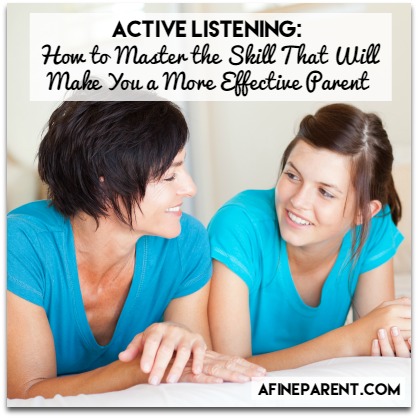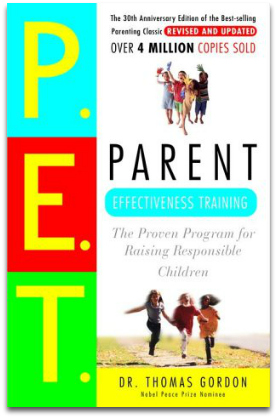 “YOU NEVER LISTEN TO ME!!!!”
“YOU NEVER LISTEN TO ME!!!!”
The scream echoes through the house. As does the slam of the bedroom door.
Have you been there?
It’s an all too familiar family scene. It’s after dinner, homework isn’t even close to being done, and a mild reminder about finishing up a book report has turned into WWIII.
My husband and I look at each other. I have steam coming out of my ears. He looks as if he’s witnessed a car crash.
“I just wish he’d listen to me!” I fume as we straighten the pictures on the walls sent rocking by the shockwaves.
Meanwhile, my son sulks in his room. “I just wish you guys would listen to me!” he vents.
But I AM listening!
Then again, am I really?
While I was in grad school where I was getting my master’s degree in organization development, I learned that not all listening is created equal. As an organization development (OD) consultant, we practice something called “active listening” as a means to help clients analyze their issues and brainstorm solutions.
I never suspected it then, but I was also learning how to be a more effective parent.
Active listening is a way of fully hearing what the other person is saying. Not just assuming we know what they’re going to say after hearing the first two words and then spending the rest of the time they are talking preparing a perfect response. Instead, active listening focuses on dropping assumptions and working to understand the feelings, motives, and views of the other person.
We don’t quite realize it, but a lot of the time, we as parents, don’t listen actively at all.
How often have you just heard a few words from your kids and jumped in to correct them or offer solutions? How often have you lost patience while kids fumbled to put their complex thoughts and emotions into coherent sentences? How often do you just take a look at the situation and know what needs to be done, without even giving your kids a chance to explain?
Yeah, when I viewed my conversation with my son that evening through the lens of what my professor had told me about active listening, I was quite ashamed.
It was time to try something different.
Active Listening as the Key to Effective Parenting
 Every relationship is built on communication. Successful communication can move mountains. Bad communication makes real life look like the stuff on reality television.
Every relationship is built on communication. Successful communication can move mountains. Bad communication makes real life look like the stuff on reality television.
Good communication, however, doesn’t just happen overnight. It takes practice and work.
Parenting, at its core, is the ultimate communication relationship. Active listening paves the way for us to have a better relationship with our kids.
To feel heard is to feel respected, valued, and loved. When our kids feel like we really listen to them, it builds their confidence and self-esteem. It reduces arguments. It makes them feel intelligent and capable. It builds emotional intelligence.
One of the most stressful moments in our household is right after we get home from school. Homework and instrument practice loom in the background. I would like to tackle it head on. My son would rather wait for a more auspicious moment. It drives me bonkers. But pushing him into doing his homework is going to result in anger, possibly an emotional meltdown, and poorly done work.
Switching intentionally to active listening has made a huge difference in how this scenario plays out in our house these days. Here’s a rough outline of how to go about active listening:
#1 – Take a Deep Breath
 Really. Take a deep breath. Notice how you are feeling. Are you angry? Frustrated? Exasperated?
Really. Take a deep breath. Notice how you are feeling. Are you angry? Frustrated? Exasperated?
Release the breath and calm down. Carrying the anger or frustration from your perception of the situation (or worse, from something else that happened during the day) into this conversation isn’t going to help. Being calm and maintaining an open and positive attitude will.
#2 – Make Eye Contact
As this article from the Michigan State University Extension Office says, “[Eye contact] shows attentiveness and interest in what is being said.” So, get rid of all the distractions. Phone down. Television off. Books away. It’s just you and him. Some children are reluctant to make eye contact. Be gentle and politely ask him to look at you. By maintaining eye contact you are showing them that they matter.
#3 – Define the Purpose
Tell them what you want to talk about. For instance, say “Bobby, I’d like to talk to you about doing homework.” This helps take away any anxiety and raises the chances that they will actually listen. Nothing is worse than sitting across from your mom wondering what you did wrong now. Emphasize that no one is in trouble or going to be in trouble for anything said to also reduce anxiety.
#4 – Use I-Statements
 I-Statements are a great way to tell your child how you are feeling and have them actually listen. I-Statements, a phrase coined by Thomas Gordon in his 1970 book Parent Effectiveness Training
I-Statements are a great way to tell your child how you are feeling and have them actually listen. I-Statements, a phrase coined by Thomas Gordon in his 1970 book Parent Effectiveness Training take the blame out of the sentence. It pulls it from being an accusatory fact to being your opinion. Here is how to put together an I-Statement.
“I feel (emotion) when (the thing or situation that caused the emotion happens). I would like (what you would like to happen).”
It’s important to identify specific feelings and behaviors. Saying “I feel angry when you do that,” isn’t going to work. The word “that” is way too general and a general statement is easy to blow off.
How many times have we thrown up our hands in frustration and said, “You just sit there and play and don’t do any of your work! If you don’t do a little of your homework every day you are going to be buried by Thursday night!”
I know I have. And all my son does is either yell back or sulk. All the you-you-yous in that sentence can feel like attacks. Watch what happens when we turn the sentence into an I-Statement.
“I feel nervous and anxious when I don’t see you working on your assignments. I would like to see you doing a little bit every day.”
Which one would you feel better about hearing?
#5 – Let Your Child Respond
Let your kids respond to you. Maintain eye contact and listen until they’re done. Don’t interrupt and don’t start formulating your response until they’re finished speaking. You might be surprised at what you hear when they feel that you are actually listening to them.
In one recent conversation about doing his homework my son told me, “I’ve had a really busy thinking day. I just need a while for my brain rest and play with my Legos.”
Haven’t we all had days like that?
#6 – Summarize What You Heard Back
 Take what you heard, put it in your own words, and then say it back to them.
Take what you heard, put it in your own words, and then say it back to them.
If I were summarizing the sentence from step #5, I would say, “Okay, I think I heard you say that you don’t feel like you can do your homework right now. Is that right?”
Note that I did not just parrot back what he said to me. I took the time to think about it and put it in my own words. He will also then take the time to think about what I said and decide if I understood.
#7 – Don’t Fear Silence
You know all that rapid fire dialogue on The West Wing? People don’t actually talk that way. There are pauses and silences. If your child doesn’t respond right away, don’t panic!
Silence doesn’t mean they aren’t listening, and it doesn’t mean you have to keep talking. Silence means they’re thinking and listening; and that is a great thing.
So just relax, maintain eye contact, and let them think.
And keep going until the issue is resolved.
Using Active Listening in the Real World
The following is an actual conversation I had two weeks ago with my 9-year-old son, Evan.
Me: “Evan, I would like to have a conversation with you about getting homework done. Can we meet at the table in two minutes, please?” (He is the kind of person that needs a few minutes to mentally transition out of what he’s doing and into something else.)
Me: (We are at the kitchen table. It is clear of distractions.) “So, Evan, I am aware that you have a lot of homework this week and I am feeling anxious because I don’t see you working on any of these assignments. I would feel less anxious if I saw you working.”
Evan: “I know what I have to do. I’ll get it done!”
Me: “I hear that you know what all your assignments are, and you are sure you can get it done. Is that right?”
Evan: “Yes. I can get it done even though I’m playing now.”
Me: “I am feeling anxious because I don’t know what your plan is for getting it done. I would like to know your plan.”
Evan: (relieved) “Oh! My plan tonight is to watch the Wonderopolis video and write my comments for it, practice my spelling, and get my Feasting Unit recipe written out. Tomorrow I’m doing my German poster with my spelling and then on Thursday I’ll finish my math, culture worksheet, and finish up the spelling practice for my test on Friday.”
Me: “Okay! I hear that you have a plan for everything. When do you think you’ll start your homework tonight?”
Evan: “I just need to play for a little while longer. I can do it when you start dinner.”
Me: “Great! So, I will call you when I start cooking dinner?”
Evan: “Yes. I will play until you start dinner.”
It’s like a miracle. No shouting happened and he’s taking responsibility for doing his homework. We both felt very relieved afterwards.
A Humbler Approach
 When I was 3, my dad took me fishing for the first time. He baited my hook and cast out the line.
When I was 3, my dad took me fishing for the first time. He baited my hook and cast out the line.
He loves to tell me, “You got all settled in your lawn chair and then looked at me with your big brown eyes and said, ‘Okay, Daddy, you can call the fish now.’ My God. The power I felt was amazing.”
Parents love that our children believe we can fix everything – from boo-boos to heartache. And we like to believe it, too.
But sooner or later your child is going to find out you don’t have all the answers. Part of what makes becoming a teenager so hard is that they finally know, for sure, that you can’t really fix everything. They start to see us as human and fallible.
Active listening invites a humbler approach to parenting. You are admitting, right off the bat, that you can’t fix everything alone. That you need their help. That you are partners in this process.
Taking this humbler approach makes the teen years, with its larger issues, less stressful for the whole family. Your child knows you will listen and help. They are used to feeling heard, and their intelligence valued. They are certain that you can fix it together.
The 2-Minute Action Plan for Fine Parents
For our quick contemplation today, answer these questions honestly. Remember there are no right or wrong answers. These are just here to help you figure out how you communicate with your kids and what you can do to be more effective –
- Do you really listen to what your kids have to say? How often do you hear your kids say “you’re not listening” in a conversation where you thought you were paying attention? How often do you jump in with corrections or solutions in a normal everyday conversation?
- When you are talking to your kids, how often do you bring your own baggage to the conversation? Could you benefit from the simple habit of taking a long breath to get your emotions under control before you go into conversations that normally tend to blow up (like the example of homework in our household)?
- When you are talking to your kids, do you make eye contact? Do your kids know that you are really interested and want to listen?
- Can using I-Statements improve your relationship with your kids? Take a scenario from your family that happened in the past 24 hours and pick one thing you said. Will using the following template make it better – “I feel (emotion) when (the thing or action that caused the emotion happens). I would like (what you would like to happen)”?
The Ongoing Action Plan for Fine Parents
Over the next week, practice active listening over dinner in regular, non-confrontational conversations. Use I-Statements. Summarize back and clarify. The more you practice when you are calm and relaxed, more success you will have when emotions are running high.
Start journaling or making little notes of active listening successes or failures. Writing out your thoughts after the fact helps to raise your self-awareness. Having a higher self-awareness will help you express yourself more effectively the next time you are in the middle of an active listening conversation.
Encourage your children to start active listening conversations with you. Let them know you expect communication to be a two-way street and that you are open to hearing anything they want to say. The more you practice actively listening to each other, the more natural the conversations will feel and the more deeply you will know your child.
A Fresh perspective
Thank you, very timely and a good reminder!!
Ok, I remember a few (yeah, probably more than a few!) times when I was a bratty teenager, and this strategy would totally backfire (because I was being a bratty teenager). How do I handle this when it inevitably happens to me when my kiddos are teenagers? It went something like this:
*after the chat about “i see you have things to get done and haven’t started” opening chat*
Parent: “So, Jess, I am aware that you have a lot of homework this week and I am feeling anxious because I don’t see you working on any of these assignments. I would feel less anxious if I saw you working.”
Me: “I know what I have to do. I’ll get it done!”
Parent: “I hear that you know what all your assignments are and you are sure you can get it done. Is that right?”
Me: “Yuuuuup!”
Parent: “I am feeling anxious because I don’t know what your plan is for getting it done. I would like to know your plan.”
Me: OMG dad I said I’ll get it done and I will GAH!
I just remember being a teen (thanks for putting up with me, dad!) and I wasn’t a complete jerk all the time but there were definitely some days that I was. How do you handle a situation like this, where you get a non-answer, and they’re adamant about giving non-answers?
LOL. I don’t think you have to be a bratty teenager for things to go down that path, Jessica. My daughter is six and she sometimes answers that way. Heck, I think I sometimes still respond that way to my mom 🙂
So when my daughter does this, I respond in one of these two ways and generally it works…
Option 1: If I’m not too stressed about it, I let it slide. If time goes by and she still hasn’t done anything about it, and I’m starting to get really anxious, then I bring it up again. If not, I’ve implicitly shown her that I trust her to do it by herself, and sometimes that alone is enough for her to get started.
Option 2: If I’m really anxious, or if I’ve already asked her before and this is the second time I’m coming to her about it, I put an arm on her shoulder, get her to look at me and then say
“I know you can handle it by yourself, but I am your mom and I sometimes worry. Both of us will be better off if you just tell me what your plan is.”
or
“I don’t like nagging you and I know you don’t like me to nag you either. I know you can do it by yourself, but I need to know what your plan is so I don’t start worrying. So… want to tell me about what your plan is?”
Or some variant of it that goes along the line of “I’m human, and when I’m worried, I’ll respond like most humans do and that’s not always pleasant, so work with me here”. Generally it works… (not just with my daughter, but my husband too ;)).
I get this from my son, too. I take a deep breath and as calmly as I can I say, “I know that you will get it done. I believe in you. I have so much going on I just need some reassurance from you to help me not feel so anxious.”
A lot of times my son needs to hear that I believe him and that I believe *in* him.
He needs to know that I’m asking for his plan not because I don’t think he has one, but because I have so many balls in the air I need reassurance that he’s got this. We’re a team.
Good Luck!
Malinda
Good strategies! Thanks 🙂
Nice piece. I know one of my biggest problems is trying to offer too many solutions right away. For my middle child in particular we are better off if I just let her explain her frustrations and I just sit with her. When she wants ideas she’ll ask for them when she’s ready, but I’ve had to learn not to just jump in.
Gosh, I know what you mean!!! My daughter is very strong-willed. If my solutions aren’t what she wants, she pushes back with all her might. And we end up fighting instead of solving the problem. So almost out of necessity, I’ve had to learn to tamp down on my natural urge to offer a solution and train myself to somewhat listen patiently (or gently nudge her along when I just can’t stand it anymore 🙂 ) as she comes up with her solutions.
Trish, Cecille and Sunrita – So glad the article resonated with you. Thank you so much for taking the time to let us know 🙂
A brilliantly written article so appropriate for today’s time when we forget to have a one to one conversation driven by pressure of time and gadgets for assistance ! Thanks for sharing it.
Thank you so much for sharing! God bless!
Great practical advice!
Thank you for sharing. It is what I need and I will practice active listening. Your mail came at the right moment.
I don’t think I’ll ever tire of hearing “Your mail came at the right moment” — these are the words that keep me going 🙂
Thanks for taking the time to let me know, Felicia.
I was thrilled to read this article! It is exactly what I have been looking fOr. My son is 13 and has Aspergers so communication with him can be especially trying at times. This article was exactly what my husband and I need. Thank you so much!
So glad to hear that you’ve found the article helpful, Amy. Thank you so much for letting us know!
I love this! Learning how to actively listen was one of those skills that literally changed my life. In addition to all of the great tips listed here, paying attention to “tone of voice” is (I believe) a key element. Here’s the theory: someone’s tone of voice – the emotion you hear when someone speaks – is the real indicator for what their words mean. As an example, after a long day for everyone, a family gathers in the kitchen. As dinner preparations take place, the mom looks up at the oldest sibling and asks, “How was your day?” What gets said, is “Fine.” What the mom hears is anger in her child’s voice which clearly indicates the opposite of what the word “fine” means. If that mom is actively listening, she’ll hear both tone of voice plus what was said simultaneously. When she replies, her answer will “speak” to her child’s tone of voice.
I remember feeling awkward when I first practiced active listening – but, with practice (because this is a skill that can definitely be learned), it became second nature. Thanks so much, Malinda, for breaking this down into easy learning steps and for the list of resources. I’ll be checking them out.
Kathy
Thanks, Kathy — that is a great point! I am at the “beginner level” in practicing active listening, and I fumble, but when I get it it even partially right, I’m amazed with the results. And it works great not just in my interaction with my daughter, but everywhere! I love the idea of focusing on the tone of voice… I do notice it, but I don’t think I do it intentionally (or mindfully). Will definitely start paying more attention. And thank you for the wonderful example scenario that really made it clear!